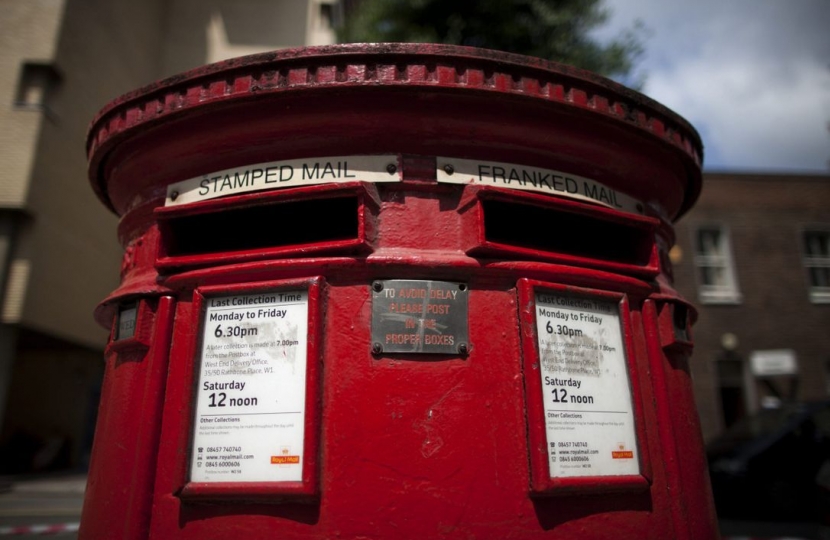
Independent Journalist Nick Wallis has played a key role in reporting the Post Office Horizon Scandal, and holding both the Post Office and Fujitsu to account. Lucy Allan MP is determined that justice must be done by those sub-postmasters who were wrongly accused, convicted and jailed as a result of the scandal. She has welcomed Nick's reporting and the transparency it has brought to this issue.
The case of sub-postmaster, Dawn O'Connell, who passed away before her name could be cleared has been reported on Nick's website here, along with a comprehensive journalistic record of the entire scandal.
You can read Nick's article below:
Dawn O'Connell
It's sometimes difficult to keep sight of the fundamental reason we are in court this week. A reminder was provided by Ben Gordon QC, right at the end of the day. Mr Gordon represents Dawn O'Connell, a Post Office manager in Northolt who was prosecuted for theft and false accounting by the Post Office on the basis of Horizon evidence. Dawn died last year, but her brother Mark and son Matt were in court five today to hear Mr Gordon's statement. Mr Gordon dialled in remotely, but it was a good line, and his voice could be heard clearly and forcefully in the court. His words were very moving.
I'd never met Matt or Mark before, but we swapped numbers. As I was walking home Mark called me up and asked me to read out what Mr Gordon had said in court. He put me on speakerphone so his mum could hear. As I read from my notes, standing in a doorway on my mobile phone in The Strand, I could hear her sobbing in the background.
The transcript of Mr Gordon's statement, as reported by Nick Wallis, is:
"My Lord, Ms Dawn O'Connell is not here today, having passed away in September of last year. I myself never had the chance to meet Ms O'Connell. Her appeal against her conviction is advanced or continued in her son Matthew's name. Matthew O'Connell and Dawn's brother, Mark, as I understand it, my Lord, are present in court today, next door in the overflow court.
My Lord, in the years following her conviction in 2008, and the serving of her suspended sentence, Ms O'Connell's health, both physical and mental, declined dramatically. According to her family and loved ones, her personality also changed, irrevocably. She became increasingly isolated, ultimately reclusive, as described by her family, and struggled desperately to deal with the stigma of her conviction.
She suffered, my Lord, with severe bouts of depression. She did receive treatment, medication and counseling, but she sunk inexorably into alcoholism. In her latter and final years, my Lord, I understand that Ms O'Connell made repeated attempts upon her own life. In September of last year, her body succumbed to the damage caused by her sustained abuse of alcohol and she died tragically at the age of 57.
My Lord, on behalf of her son, her brother, and all her surviving family members and friends, I feel compelled to tender to the court their sincere regret and deep anguish that Dawn is not here today to hear her case being argued.
My Lord, Mrs O'Connell's conviction dates back to August of 2008 and Harrow Crown Court, where, upon her own pleas of guilty, she was convicted of five counts of false accounting. One further count alleging theft of approximately £45,470 was ordered to lie on the file on the usual terms and was not proceeded with. A pre-sentence report was ordered and, a month later, in September, Ms O'Connell was sentenced to 12 months imprisonment suspended for two years, with a requirement for the completion of 150 hours of unpaid work.
My Lord, between 2000 and 2008, Ms Dawn O'Connell worked as a branch manager, a Post Office branch manager in Northolt. My Lord, as with many others which are before the court today, and as my learned friend Mr Saxby did, where it is applicable to Mrs O'Connell's case, if I may, I echo and commend to the court my learned friend Mr Moloney's submissions. But Mrs O'Connell's case was one in which the Horizon data was central, central to the prosecution and her conviction. The prosecution arose from an unexplained shortfall, or deficit on the system at her branch. When audited, Mrs O'Connell reported the shortfalls and indicated that she was unable to explain the anomaly. Initially, as she explained, she had hoped that the error would correct itself, but over the ensuing months it grew and accumulated.
Ultimately, my Lord, having admitted falsifying the accounts in an attempt to conceal the deficit in the hope of preserving her job, she pleaded guilty to the offences of false accounting. Throughout the audit, throughout the investigation and throughout the prosecution, Ms O'Connell repeatedly and strenuously denied theft. As I have said, this count was left to lie on the file.
My Lord, as conceded by the respondent in relation to her appeal, there was no evidence of theft or any actual loss at her branch, as opposed to a Horizon generated shortfall. There was no other evidence to corroborate the Horizon data. On the contrary, my Lord, evidence was collected from other employees which attested to Ms O'Connell's honesty and probity.
As further conceded by the respondent in her case, no attempt was made by the Post Office, as private prosecutor, to obtain or interrogate the ARQ data. There was no investigation into the integrity of the Horizon figures, and it is recognised that the appellant herself was severely limited in her ability to challenge the Horizon evidence and therefore that it was incumbent upon the Post Office to ensure that the reliability of the evidence was properly investigated and, my Lord, this was not done.
The Post Office failed, in my respectful submission, in its duty as a private prosecutor both to investigate properly the reliability of the system by obtaining and examining the data, and to disclose to the appellant or the court the full and accurate position in relation to the reliability of the system. No disclosure was forthcoming in Ms O'Connell's case, my Lord, in relation to any concern or enquiry raised into the functionality of the system.
Ms O'Connell's case file demonstrates that the focus of the investigation in her case was on proving how the accounts were falsified, which of course she had admitted, rather than examining the root cause of the shortfall. In fact, as it seems, no effort was made to identify or discover the actual cause of the shortfall or deficit. During the internal audit process, and her interviews under caution, my Lord, Ms O'Connell raised the issues she had encountered with the system and its recurring anomalies. No investigation or disclosure followed.
Notwithstanding, and by reference to the balancing exercise which the court is required to undertake in a submission of this kind, Ms O'Connell was a lady of hitherto good character, about whom people were, it seems, lining up to attest to her honesty and integrity. My Lord, in the papers I have seen, I have counted somewhere in the region of 30 character statements, which I think were obtained on her behalf. My Lord, it is conceded by the respondent that for these reasons it was not possible for Mrs O'Connell's trial to be a fair one, thereby amounting to first category of abuse of process.
However, as set out, only a short while ago by Mr Moloney on behalf of his clients, and as set out in our skeleton argument, dated 21 January, we would respectfully submit that for the same set of reasons, or in respect of the same failures in the investigative and disclosure exercises, the prosecution against Ms O'Connell was rendered unconscionable, and that bringing it was an affront to the national conscience. Accordingly, my Lord, on her son Matthew's behalf, we respectfully invite the court to quash her conviction on both grounds, or both limbs of abuse of process. My Lord, unless I can assist you any further, those are my submissions on Ms O'Connell's behalf."
Credit: Nick Wallis
https://www.nickwallis.com/

